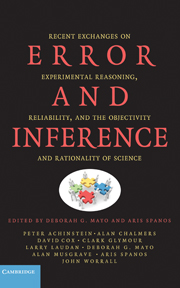 Error and Inference
Error and Inference Book contents
- Frontmatter
- Contents
- List of Contributors
- Preface
- Introduction and Background
- 1 Learning from Error, Severe Testing, and the Growth of Theoretical Knowledge
- 2 The Life of Theory in the New Experimentalism
- 3 Revisiting Critical Rationalism
- 4 Theory Confirmation and Novel Evidence
- 5 Induction and Severe Testing
- 6 Theory Testing in Economics and the Error-Statistical Perspective
- 7 New Perspectives on (Some Old) Problems of Frequentist Statistics
- 8 Causal Modeling, Explanation and Severe Testing
- 9 Error and Legal Epistemology
- Index
- References
5 - Induction and Severe Testing
Published online by Cambridge University Press: 29 January 2010
- Frontmatter
- Contents
- List of Contributors
- Preface
- Introduction and Background
- 1 Learning from Error, Severe Testing, and the Growth of Theoretical Knowledge
- 2 The Life of Theory in the New Experimentalism
- 3 Revisiting Critical Rationalism
- 4 Theory Confirmation and Novel Evidence
- 5 Induction and Severe Testing
- 6 Theory Testing in Economics and the Error-Statistical Perspective
- 7 New Perspectives on (Some Old) Problems of Frequentist Statistics
- 8 Causal Modeling, Explanation and Severe Testing
- 9 Error and Legal Epistemology
- Index
- References
Summary
Although I have offered some criticisms of her views on evidence and testing (Achinstein, 2001, pp. 132–40), I very much admire Deborah Mayo's book (1996) and her other work on evidence. As she herself notes in the course of showing how misguided my criticism is, we actually agree on two important points. We agree that whether e, if true, is evidence that h, in the most important sense of “evidence,” is an objective fact, not a subjective one of the sort many Bayesians have in mind. And we agree that it is an empirical fact, not an a priori one of the sort Carnap has in mind. Here I will take a broader and more historical approach than I have done previously and raise some general questions about her philosophy of evidence, while looking at a few simple examples in terms of which to raise those questions. It is my hope that, in addition to being of some historical interest, this chapter will help clarify differences between us.
Mill under Siege
One of Mayo's heroes is Charles Peirce. Chapter 12 of Mayo's major work, which we are honoring, is called “Error Statistics and Peircean Error Correction.” She has some very convincing quotes from Peirce suggesting that he was a model error-statistical philosopher. Now I would not have the Popperian boldness to say that Mayo is mistaken about Peirce; that is not my aim here.
- Type
- Chapter
- Information
- Error and InferenceRecent Exchanges on Experimental Reasoning, Reliability, and the Objectivity and Rationality of Science, pp. 170 - 201Publisher: Cambridge University PressPrint publication year: 2009
References
- 1
- Cited by


